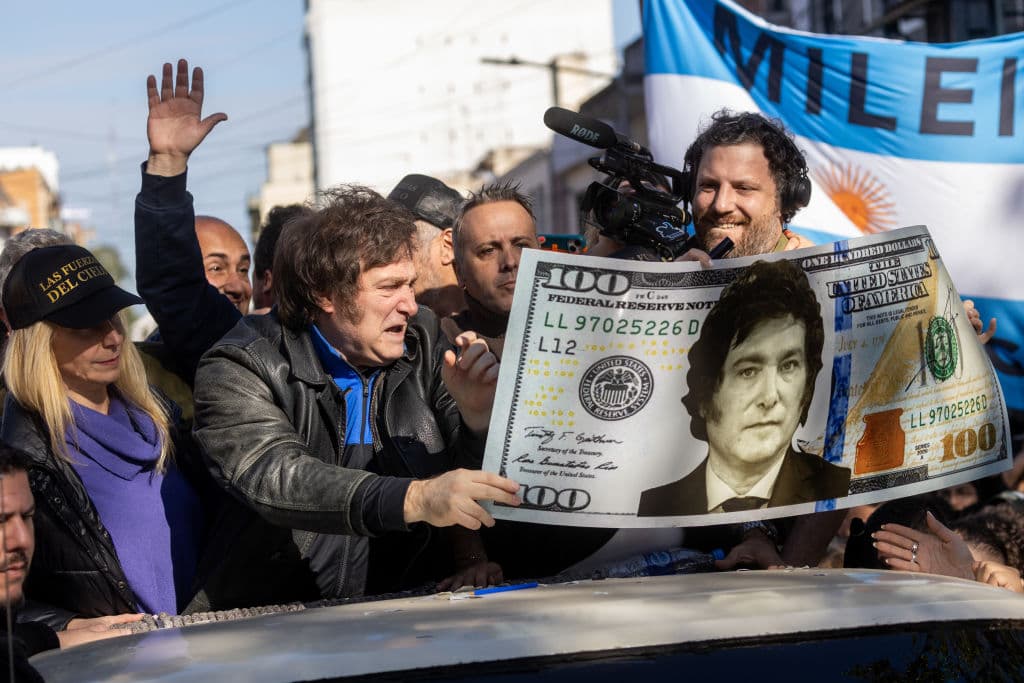Argentina: Testing Time for Its President-Elect
Javier Milei is being buffaloed off his campaign promise of dollarization — even before his term begins.

News from Buenos Aires suggests that President-elect Javier Milei is being buffaloed off his campaign promise of dollarization. Call it a warning that he could lose his whole program even before he takes office. For it underscores that inflation has an enormous constituency. Our guess is that it’s a fight Mr. Milei will have to win not in the central bank but in the political arena, where the president is but one player.
It’s not a catastrophe that opposition is appearing early. Lose early, win late, we say. The latest is that Mr. Milei is refuting, via X, what he calls “false rumors” that the core pledges that propelled him to the presidency are being dialed back amid what Reuters calls “signs that he is picking a more moderate Cabinet than expected.” Yet shutting down Argentina’s central bank is a “non-negotiable matter,” the chainsaw-wielding maverick avers.
What, though, of the self-described anarcho-capitalist’s vow to dollarize Argentina’s monetary system? As a candidate, Mr. Milei stressed the need to jettison the country’s inflation-ravaged peso and use the American dollar as the nation’s unit of exchange. He decried the peso as “a currency emitted by Argentine politicians” and mocked it as not “worth excrement,” in that the central bank-issued notes aren’t even usable as fertilizer.
Such colorful rhetoric was of a piece with Mr. Milei’s call to upend the political establishment, in his words a “political caste” comprising “useless parasites” who were “trembling” at the prospect he might win. His harsh words resonated with the electorate, who granted him, by a landslide, a mandate to reverse decades of Perónism, the leftist mix of unionism, statism, and nationalism that drove Argentina’s economy into the ditch.
Is Mr. Milei walking back his plans? The new president’s pick for the central bank post, Emilio Campo, “turned down the job over policy differences,” the Financial Times reports. It lays to that the idea that Mr. Milei “is backing away from his flagship policy” of dollarization. Mr. Campo was already drafting blueprints to dollarize. “He was never going to the central bank to implement someone else’s plan,” the FT notes.
Markets are cheering, in Bloomberg’s telling, the portents that Mr. Milei is going wobbly. He has “pivoted away from advisers advocating for his most dramatic campaign promises,” Bloomberg says, “choosing Wall Street veterans” closer to a former president, Mauricio Macri. Plans for dollarization “appear at least on hold for now,” Bloomberg reports, pointing to the departure of a hawkish adviser, Carlos Rodriguez.
If these reports prove accurate, it wouldn’t be the first time a firebrand candidate, faced with post-election reality, is forced to scale back campaign promises. Remember President Trump’s plans to build a wall paid for by Mexico? That never happened despite a GOP majority in both houses of Congress. Mr. Milei’s ability to enact his agenda is constrained by “a limited number of seats in Congress and no provincial governors,” Reuters rues.
Dollarization, though, was never going to be a cakewalk. Does Argentina hold “enough dollar reserves” to implement such a policy, wonders one institution, the Wall Street Journal’s Joseph Sternberg. Does it “have the fiscal discipline to sustain it,” not to mention “whether the banks could survive it.” Yet advocates of the policy, like the Cato Institute, contend Argentina has “already unofficially dollarized.”
Signs of de facto dollarization include the fact that some “80 percent of used cars” are now sold in Argentina in dollar-denominated trades, Cato notes. Argentines themselves have built up a dollar horde of some $265 billion, per economist Steve Hanke, making it easier to transition to the greenback. The most compelling reason to dollarize, though, Mr. Sternberg suggests, is that Argentina’s voters, by choosing Mr. Milei, opted for the policy.
Bingo. Whatever else one can say about Argentina’s voters, they are not dumb. They “sent a signal about what they are and aren’t prepared to pay to clean up their economic mess,” Mr. Sternberg* notes, pointing to Greece, whose voters, amid its economic crisis, chose fiscal discipline rather than abandoning the Euro. All the more reason for Mr. Milei to hold fast to the promises he made to the Argentines to fight inflation.
________
* Who at the outset of his illustrious career pulled an oar in the Sun’s editorial galley.

